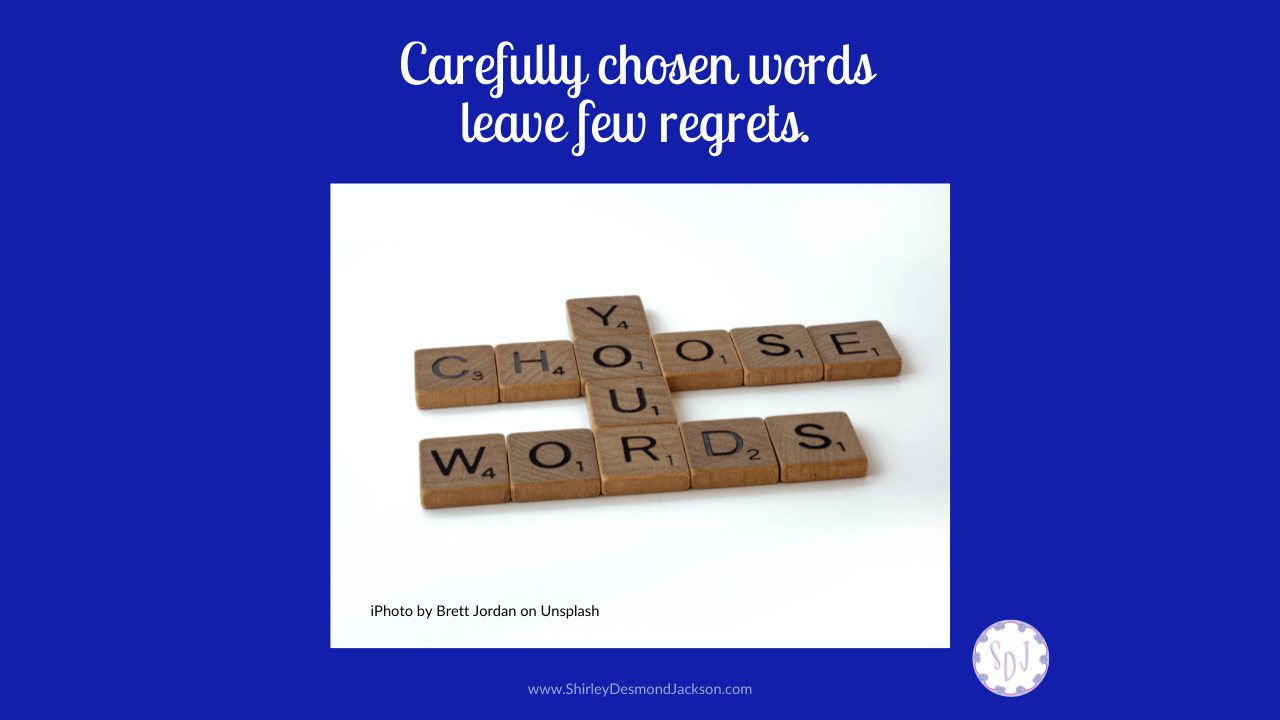How We Can Choose Our Words To Help, Not Hurt
“Oh, No!” The collective roar from the passengers around me grabbed my attention. Pulling out my earphones, I asked the man sitting next to me what had happened. He shrugged, “We have to get off the plane.”
Imagining all kinds of horrific scenarios, I gathered my possessions and followed the others off of the plane. Once we made it to the terminal, I discovered what had caused our abrupt exit.
When offered a sanitizing wipe from the flight attendant, a passenger responded with, “I don’t want your (expletive) wipe!” Concerned over his aggressive attitude, the flight crew asked the passenger to leave the plane. When he refused, they instructed all of us to disembark so they could safely get him to exit the plane. One of my fellow passengers heard the flight crew tell this unruly passenger he would now be put on a “Do Not Fly” list.
Soon a debate began among the remaining passengers. Did the flight crew overreact? I don’t know. But I understand their decision, given the recent increase in violent attacks against flight crews.
For me, the incident illustrated a universal truth I used to teach my elementary students: Words are powerful.
James writes about the power of our words:
The tongue also is a fire, a world of evil among the parts of the body. It corrupts the whole body, sets the whole course of one’s life on fire, and is itself set on fire by hell.
All kinds of animals, birds, reptiles and sea creatures are being tamed and have been tamed by mankind, but no human being can tame the tongue. It is a restless evil, full of deadly poison.
With the tongue we praise our Lord and Father, and with it we curse human beings, who have been made in God’s likeness. Out of the same mouth come praise and cursing. My brothers and sisters, this should not be. (James 3:6-10 NIV)
I appreciate how James describes our inability to control our tongues. In the passage, he points out how we control ships with a small rudder, or a powerful horse with a tiny bit in its mouth (James 3:3-4). But we all struggle to tame our tongue, one of the smallest of all our body parts.
With my students we often spoke of the power of words to harm or to heal. I’m sure all of us can remember words which gave us hope or brought healing. And we can just as easily remember cruel words which crushed our spirits. Words are powerful because they leave an indelible mark on our souls and hearts.
Words spoken to me as far back as middle school, (nearly five decades ago), still have the power to cause pain, shame, or fear. They didn’t just hurt my spirit, they often imprisoned it, making me hesitant to offer myself or my gifts to the world around me.
But the memory of words I spoke to others haunts me more. People I know still feel hurt, shame, or fear because of my words. Apologies may be given, forgiveness may be offered, but there is no way to erase what I’ve said. Those words continue to have an effect.
This is why I chose to memorize the following scripture, also from James:
My dear brothers and sisters, take note of this: Everyone should be quick to listen, slow to speak and slow to become angry, because human anger does not produce the righteousness that God desires. (James 1:19-20 NIV)
In the context, James cautions us against sinning in our anger. But his warning also applies to how, and when, we use our words. Looking back, almost without exception, all the words I regret saying were said in haste or in anger. Taking the time to listen before speaking makes all the difference.
Sometimes listening means taking time to understand another’s viewpoint. But sometimes it means taking time to listen to the small, still voice of my conscience. That voice reminds me to hold back words I may regret. It encourages me to use words to build up, not knock down. It prompts me to pray before responding. It leads me to controlling my tongue.
I wonder how our airplane scenario would have played out differently if the passenger had paused before speaking? What if he’d simply said, “No, thank you.”? Undoubtedly he would have caused less stress and upheaval.
As we reentered the plane, a fellow passenger remarked she would “be watching her words carefully from now on”. To which I replied, “Me, too.”
Wherever the road leads us, may we all remember to take time to choose our words. Since they hold incredible power, let’s use them to honor the One whose Word lights our way.


Shirley, I love your words today it is a great reminder to think before you speak.
Thank you Teresa! ????
Shirley, thanks for the reminder that not only have others’ words stuck with us, but our words also stick with them. I can’t help but think about how this plays out in social media. We may be able to delete a comment we’ve posted, but we can’t erase it from the hearts and minds of those who’ve already read it.
Thank you Sheila. I agree with you about social media posts. Because the communication is done through a screen, we don’t visibly see the effect our words have on others. It makes it easier to cross lines and hurt people with our comments. And because it is such a public forum, our comments can unintentionally hurt other people who are seeing the thread. Social media can be a great tool, but it comes with some unique challenges. Thanks for sharing such a great point. ????